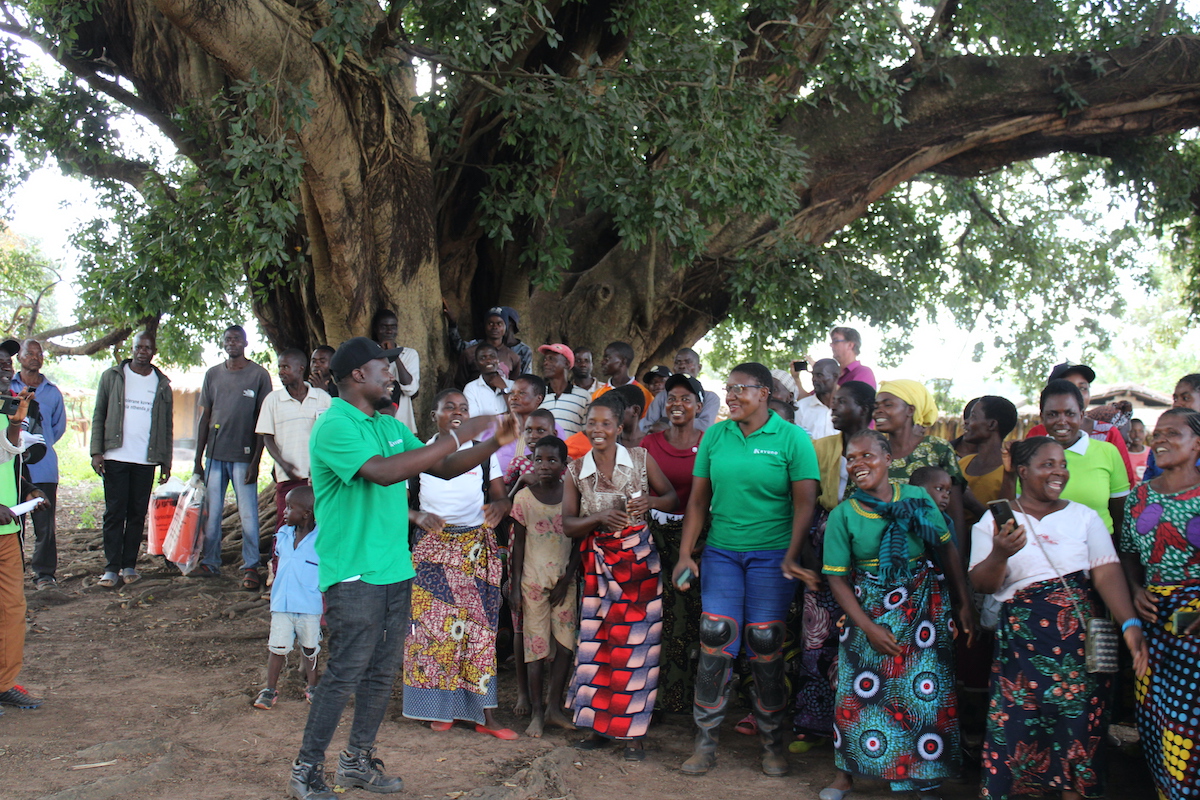Highlights
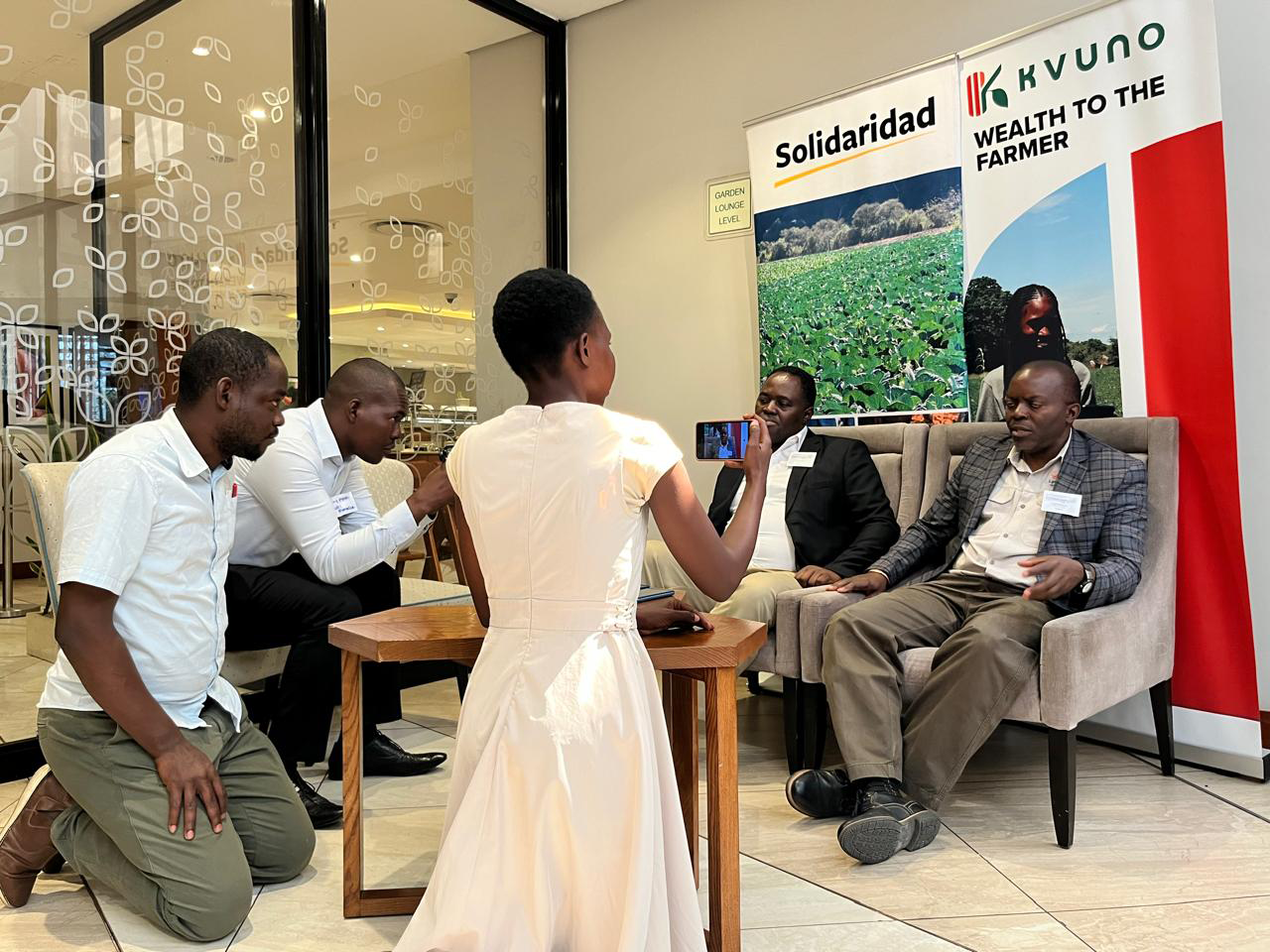
Multi-Stakeholder Policy Dialogues in Malawi, Zambia, and Mozambique
Southern Africa facilitated impactful Multi-Stakeholder Policy Dialogues in Malawi, Zambia, and Mozambique, addressing critical policy issues. In Zambia, the press conference was attended by Your Highnesses (Zambian chiefs), who were also part of the dialogues. As customary practice, the press conference was held with everyone on their knees in the presence of the esteemed chiefs, symbolizing deep respect and honoring cultural traditions.

Promoting a competitive, inclusive and sustainable leather sector (SIPS) in Zimbabwe
The SIPS project introduced the Leather Virtual Design Studio (VDS), transforming design processes for SMEs. Using 2D and 3D CAD systems, SMEs reduced design time from three days to 45 minutes, minimized waste, and improved quality. This innovation enhanced cost savings, market access, and skills development for 41 SMEs.
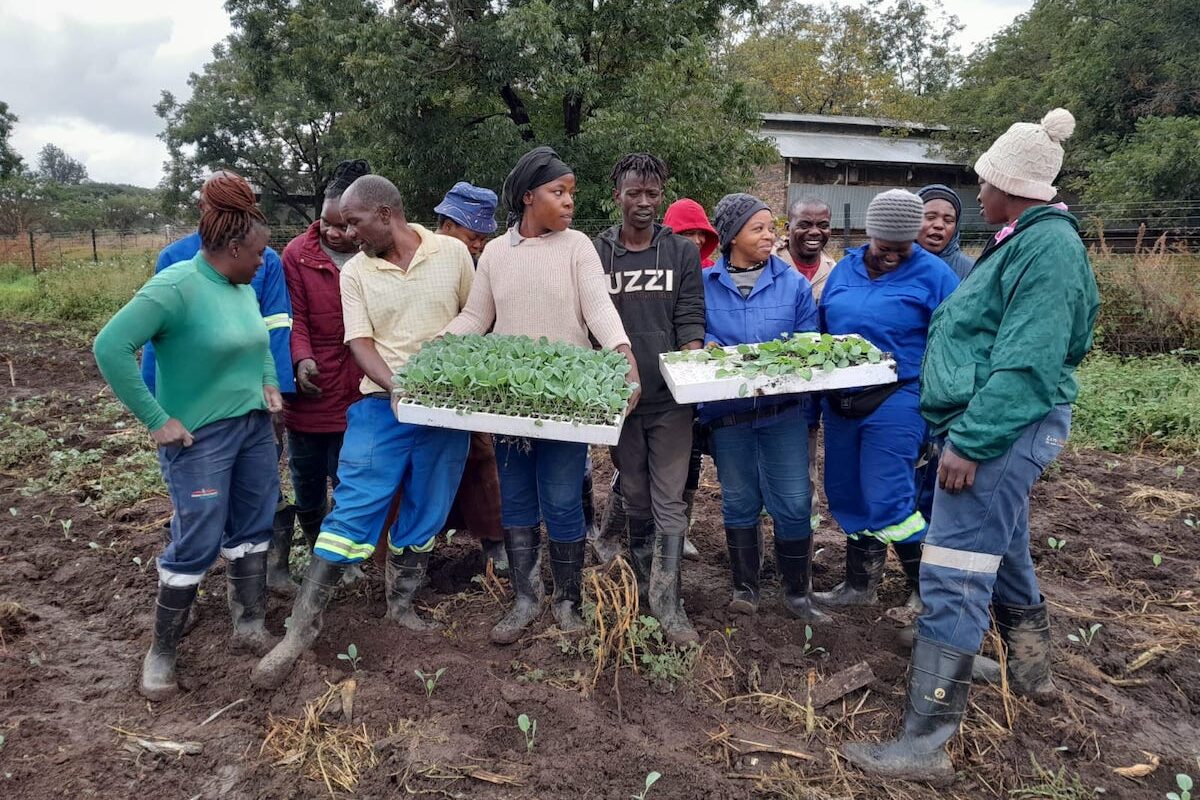
Empowering Farmers through the Social Employment Fund (SEF)’s impact on South African Retail Market Access
With training and support from Southern Africa, SEF participants now sell directly to major South African retailers, including Pick ’n Pay. This access provides smallholder farmers with a steady income, enhancing their economic resilience and driving rural development across the region.
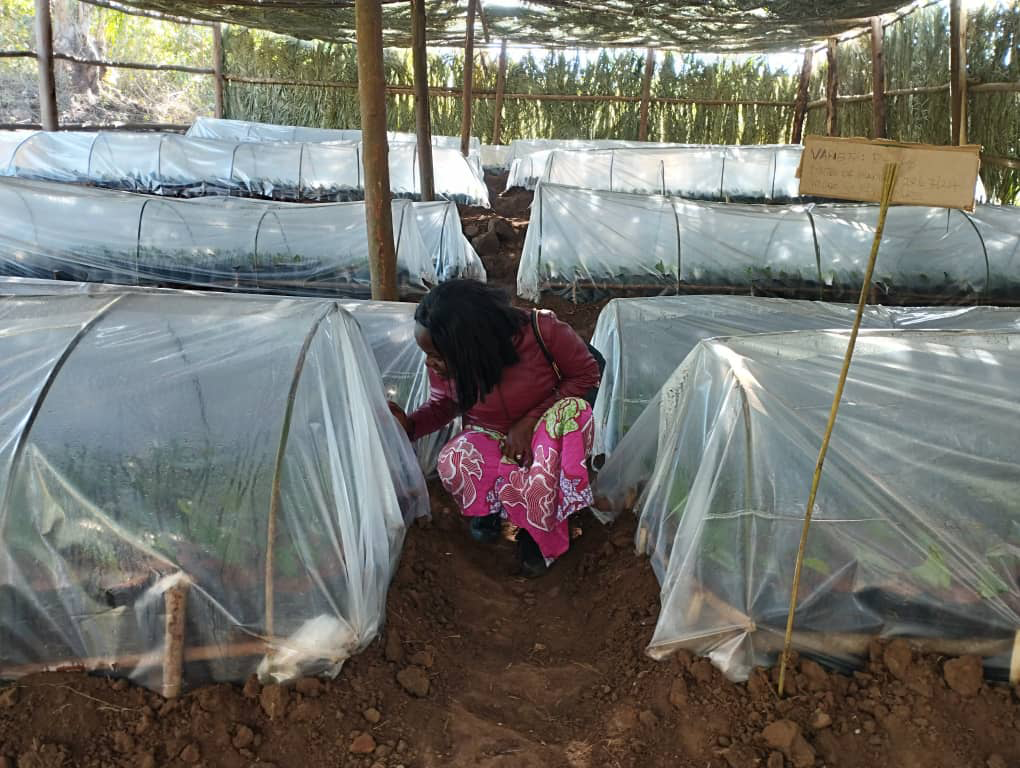
Strengthening Market Access for Malawi’s Tea Farmers
The Pathways to Prosperity Malawi project enabled tea farmers in Malawi to increase their market reach and access to buyers. This initiative led to greater integration of smallholder tea producers into global supply chains, benefiting 3,000 farmers through improved market connections and sustainable tea production practices.
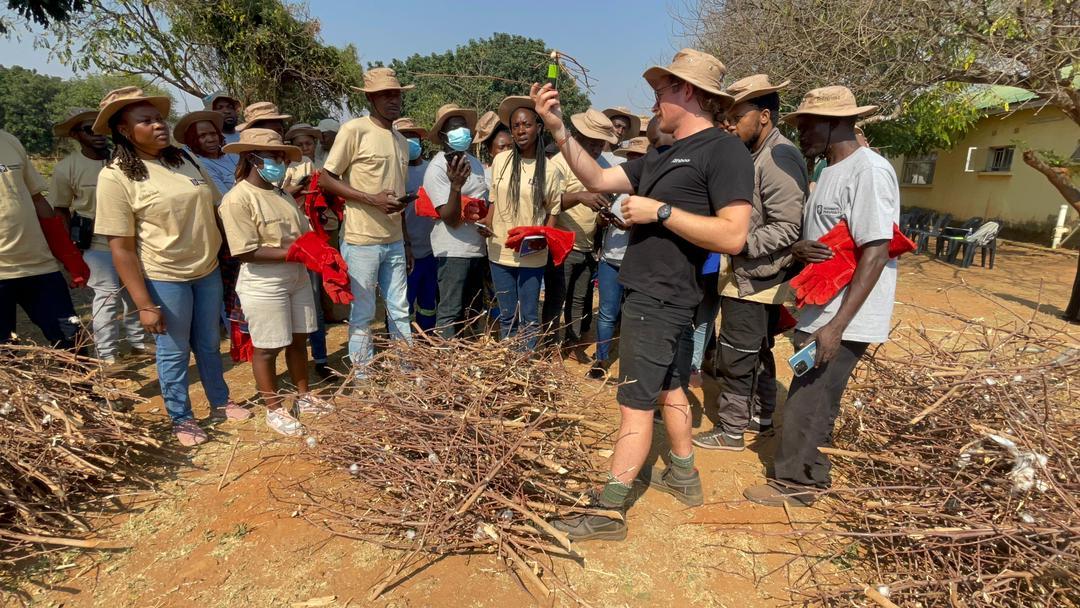
Climate Resilience in Cotton
In Mozambique and Zambia, farmers embraced biochar technology, leading to remarkable yield increases of up to 71% in cotton farming. This innovative climate-smart practice has proven to be a game-changer, significantly improving soil health and water retention in drought-prone regions, enhancing both productivity and resilience against climate variability.
Results

3,762
farmers with increased income

150,652
hectares under sustainable management

111,446
farmers benefit from improved services
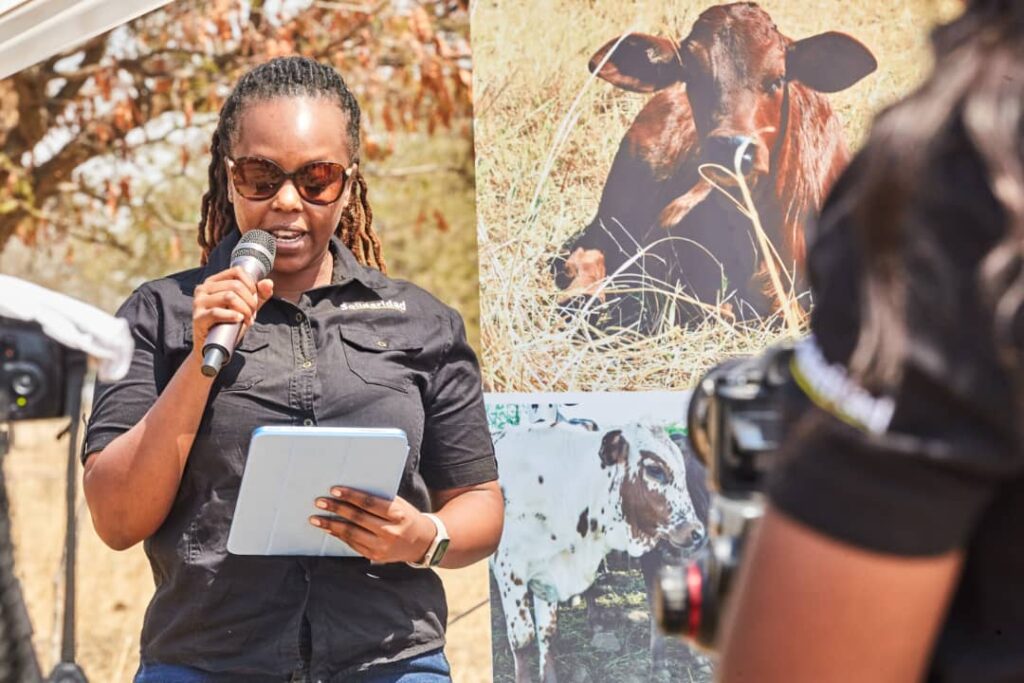
Unlocking Impact Through Integration
In 2024, Solidaridad Southern Africa unlocked impact through integration, combining landscape restoration, inclusive markets, and policy reform to drive sustainability and resilience. By advancing regenerative agriculture, digital farmer ecosystems, and enterprise support, we not only improved livelihoods but also restored ecosystems. Together, these efforts created lasting change—for people, nature, and the future.
Solidaridad Southern Africa deepened its regional impact in 2024 by enhancing land management, agricultural productivity, and fair value distribution. Through climate-smart innovation and enterprise growth, the region drove measurable progress—from Zambia’s rangelands to Malawi’s cotton fields and Zimbabwe’s leather workshops—delivering tangible benefits for both communities and the environment.
Surpassing its annual target, Solidaridad Southern Africa brought over 150,652 hectares under sustainable management, driving landscape restoration in drought-prone areas. Through the Hooves for Sustainability (H4S) programme in Zambia, rotational grazing revitalized 150,000 hectares of rangeland. Additionally, 1,250 livestock farmers received training in sustainable herd management, with 38% reporting modest calving rate increases and nearly 45% seeing improved incomes.
In Mozambique and Malawi, regenerative practices contributed to livelihood improvement by increasing cotton yields. Biochar adoption by 1,200 farmers in Mozambique increased yields from 350 kg/ha to 600 kg/ha. Solidaridad also supported 28,000 farmers in Malawi with locally multiplied seeds promoting input independence and through biochar application it raised yields from 0.9 to 1.6 tonnes/ha on cotton fields. Thousands of farmers reported quantitative income growth in 2024, with similar confirmations during follow-up surveys.
Small leather businesses in Zimbabwe benefited from sustainable manufacturing practice changes. Through the Support to Industrialisation and Productive Sectors (SIPS) programme, over half of the leather SMEs implemented green tanning methods, converting waste into products like belts, wallets, and jackets. Between 2021 and 2024, these enterprises increased revenues from USD 38,905 to USD 60,656, demonstrating the benefits of sustainable business practices.
Regionally, nearly 65,000 producers adopted sustainable agricultural methods, and over 2,200 implemented programme innovations, including rotational grazing and circular leather design. Solidaridad trained more than 75,000 producers, fostering local expertise to support future sustainability.
These outcomes resulted from an integrated programme approach combining farmer support, digital tools, enterprise development, and strategic partnerships. Initiatives such as Pathways to Prosperity (P2P), Acting Now, (Social Employment Fund) SEF, SIPS, and RECLAIM Sustainability! contributed to achieving systemic improvements.
The activities in Southern Africa reflect a synergy among productivity, income growth, and environmental management. Smallholder farmers increasingly adopted climate-resilient practices, cooperatives engaged effectively in markets, and policy frameworks became more aligned with community needs.
Looking ahead, 2025 marks a transition year. As key programmes like RECLAIM Sustainability! wind up, Solidaridad Southern Africa aims to institutionalize proven innovations. The focus will shift to embedding effective practices within national agricultural training systems, policy development, and private-sector standards. Additional priorities include accessing climate finance, enhancing traceability-linked incentives, and encouraging investments in regenerative agriculture, circular production, and inclusive market systems.
Solidaridad will continue strengthening alliances with government agencies, farmer associations, and private sector partners to expand effective models like the Open Farmer Data Ecosystem, the Farmer-to-Market Platform, and Zimbabwe’s Virtual Design Studio.
In 2024, Solidaridad Southern Africa advanced inclusive, farmer-centered service ecosystems by integrating digital tools, cooperative development, and local enterprise models. Moving beyond isolated interventions, the region embraced demand-driven support structures, driving measurable impact across multiple sectors and countries.
A total of 111,446 farmers accessed new or improved services through 43 Solidaridad-supported service providers, reaching 82% of the regional target. In Malawi’s cotton sector, a locally anchored seed supply model under the Pathways to Prosperity (P2P) project distributed 149 metric tonnes of cotton seed to 28,000 farmers. This transformative intervention covered 67% of national seed use and translated into an estimated EUR 4 million in input savings for nearly 29,000 farmers. The model’s significance lies not only in cost reduction, but in its contribution to sector autonomy by shifting control of critical inputs closer to farmer-led systems.
Support to producer organizations reached 61,828 members, primarily in cotton and tea value chains. Although this figure fell short of the annual target of 132,584, the depth of engagement was noteworthy. Field assessments pointed to improved financial record-keeping, stronger governance practices, and increased participation in local planning processes. These outcomes are key enablers for more resilient farmer organizations, with improved access to credit and decision-making power.
Employment creation exceeded expectations, with 2,014 jobs generated, nearly double the regional target. A significant share of these opportunities benefited women and youth. In South Africa, the Social Employment Fund (SEF) enabled previously unemployed individuals to earn income through food production and environmental rehabilitation initiatives. In Zimbabwe, 21 youth trained under the Skills, Innovation, and Productive Services (SIPS) programme launched microenterprises in leather footwear production. By using the Virtual Design Studio (VDS), a Solidaridad-supported digital tool, design time was reduced from three days to under an hour, accelerating market entry with customized, high-quality products. These innovations illustrate the region’s growing capacity to connect training to tangible livelihoods.
Digital integration made significant headway through the Open Farmer Data Ecosystem (OFDE), which registered 22,000 farmers across Malawi and Mozambique. By equipping participants with unique digital IDs, OFDE enabled access to real-time price information, service bundles, and digital financial tools. Although the programme fell short on some bargaining power indicators (14,164 reached versus a target of 21,800), early results suggest a shift in how farmers interact with markets, from passive recipients to informed, negotiating actors. Field-level feedback highlighted improvements in traceability, service personalization, and confidence in commercial transactions.
Not all intended outcomes were achieved. Targets related to producer organization outreach and farmer bargaining power fell below expectations, in part due to delayed onboarding processes and digital literacy constraints. In response, teams adjusted implementation strategies, placing greater emphasis on peer-led digital training and bundling access to digital tools with physical services.
Moreover, while youth employment outcomes were strong, sustaining the momentum of new enterprises remains a challenge, particularly in fragile economic contexts. Some microenterprises reported difficulty in accessing inputs or bridging the gap between start-up support and market stability. These insights are guiding efforts to strengthen follow-up support and connect youth-led enterprises to financing and mentoring networks.
The convergence of digital innovation, localized service models, and stronger cooperative structures is beginning to reconfigure rural economies toward greater resilience and inclusivity. While numeric targets were not uniformly met, the quality and adaptability of interventions laid a credible foundation for scale.
Looking ahead, Solidaridad Southern Africa will focus on institutionalizing these approaches. Priorities include:
- Consolidating digital and physical service hubs that integrate training, inputs, finance, and technical support;
- Scaling OFDE and VDS as open-access platforms serving farmers, SMEs, and development stakeholders;
- And linking producer groups to sustainable and climate-linked investment to ensure long-term viability.
2024 demonstrated that when farmers access integrated services, relevant digital tools, and effective organizations, they are better positioned to thrive. In 2025, the focus will shift to embedding these models into national systems and private-sector value chains to ensure their sustainability beyond project lifecycles.
By prioritizing systems over one-off solutions, the region is moving closer to a rural economy that is not only more equitable, but also more capable of self-sustained growth.
In 2024, Solidaridad Southern Africa advanced its work on sustainable market access by linking smallholder producers and SMEs to structured, high-value channels across the region. While only 33% of the targeted volumes were reached, resulting in 25,769 producers gaining improved access, the year offered compelling evidence that strategic inclusion models, even at modest scales, can unlock transformative value when linked to quality, branding, and long-term buyer engagement.
New sourcing models demonstrated tangible economic benefits, particularly where formal agreements were established with consistent buyers. Across the region, 12 sourcing partnerships were formalized, significantly exceeding the annual target of seven, indicating growing traction with private sector actors. These agreements introduced structured procurement terms and clearer revenue pathways for producers.
For instance, smallholder farmers supported under the Social Employment Fund (SEF) delivered 650 bunches of produce twice weekly to formal retailers such as Pick n Pay and Tsakane Agri Produce. Earning R9 per bunch, the farmers generated R11,700 weekly through these formal sales. Concurrently, they sold 11 tons of squash and pumpkin per week to local markets at R24 per 6kg unit, generating an additional R44,000 in diversified weekly income. This dual-market strategy supported more stable earnings and reinvestment, while reducing market risk exposure.
Similarly, in Zimbabwe, 21 SMEs under the SIPS programme supplied 4,100 pairs of school shoes to regional retail chains including Edgars and Jet. These SMEs met formal quality standards and secured a recurring monthly order of 100 pairs, alongside an export order of 1,000 pairs to Botswana. Over three years, their revenue increased by 55.85%, from $38,905 in 2021 to $60,656 in 2024—demonstrating the commercial viability of inclusive sourcing linked to regional integration.
The year also underscored the role of quality and branding in accessing premium markets. In Mozambique, a cohort of 100 women trained under the RECLAIM Sustainability! (RS!) programme received first prize at the 2024 Specialty Tea Expo in Kenya. Their product outperformed international competitors on quality, branding, and innovation. This achievement repositioned Mozambican specialty tea as an export-grade product and offered a gender-responsive model for niche commodity development. As a result, the initiative is now being adapted to other value chains with similar market potential.
These examples reflect a broader shift from volume-based trade to value-driven engagement. By emphasizing buyer transparency, traceability, and branding, Solidaridad-supported producers are beginning to compete on consistency, ethics, and product integrity rather than bulk output alone.
Supporting systems were also enhanced. New traceability tools and buyer-producer agreements introduced greater visibility across supply chains. These systems are laying the foundation for compliance with emerging market standards around ethical trade and sustainability, especially in climate-sensitive commodities.
However, not all outcomes met expectations. Civil society advocacy on market access fell short of its target, revealing ongoing challenges in influencing value chain governance. This points to capacity constraints among partners to shape buyer accountability and pricing mechanisms. Nevertheless, policy dialogues and traceability innovations introduced under the RS! and P2P programmes established important groundwork for future engagement.
Looking ahead, 2025 will focus on consolidating gains and testing new pathways to sustainable commercialization. Key priorities include:
- Formalizing Contracts: Expanding structured agreements to ensure pricing predictability and timely delivery schedules for producers.
- Scaling Traceability: Enhancing digital traceability systems and aligning them with certification standards for regenerative, ethical, and climate-smart products.
- Diversifying Market Pathways: Piloting access to carbon markets, institutional procurement channels, and direct-to-consumer platforms.
- Strengthening Market Recognition: Supporting SMEs and farmers to brand their products effectively, enabling premium pricing aligned with quality improvements.
These steps aim to ensure that production improvements are matched by reliable, fair, and sustainable market outcomes.
The year’s results reaffirm a key lesson: building equitable market systems is not about chasing volume but about fostering trust, quality, and shared value. Where these foundations are present, even limited market access can yield outsized impacts on livelihoods and regional trade integration.
By anchoring its approach in evidence, transparency, and adaptive learning, Solidaridad Southern Africa is helping shape a new market logic—one in which smallholders and SMEs are recognized not just as suppliers, but as strategic partners in sustainable and resilient value chains.
Solidaridad Southern Africa has advanced systemic transformation by translating evidence from field experiences into policies supporting inclusive and sustainable agriculture. Its strategic advocacy, multi-stakeholder convening, and strengthening of civil society under the RECLAIM SUSTAINABILITY! (RS!) programme have contributed significantly to regional sector-wide reform.
A notable regional outcome is the formal recognition and institutional adoption of biochar as a national agricultural practice. Policy adoption followed evidence from farmer-led trials demonstrating an average yield increase of 71%, from 350 kg/ha to 600 kg/ha among 1,200 early adopters. Beyond agronomic benefits, this recognition integrates climate-smart agriculture into national training curricula and extension services, positioning smallholders to access carbon financing mechanisms, thus reinforcing economic viability.
Civil society strengthening across the region has produced measurable advocacy outcomes. Although 57 civil society organizations (CSOs) were trained in targeted advocacy, only 18 demonstrated improved effectiveness in influencing decision-making. Nevertheless, the engagements showed strategic depth and significant impacts. Notably, the Cotton Association in Zambia collaborated to develop Decent Work Guidelines, embedding labour rights and safety within the governance of the cotton sector. Similarly, advocacy in Malawi resulted in revising the Gender Equality and Anti-Harassment Policy within the tea sector, directly enhancing working conditions for hundreds of women estate workers.
Solidaridad Southern Africa’s approach emphasized shared dialogue and collaboration, convening 29 multi-stakeholder forums that resulted in 24 formal policy recommendations. One significant outcome was Zambia’s institutionalization of the Zambia Good Agricultural Practices (ZAMGAP) voluntary food safety standard, setting new national benchmarks for quality and export readiness. In Mozambique, collaboration led to developing the country’s first National Tea Sector Strategy, addressing structural gaps within a high-potential yet underdeveloped value chain.
Despite these successes, engaging corporate and financial sectors encountered challenges. Only nine companies adopted new sustainability policies, and no financial institutions formally engaged during the reporting period. Nevertheless, foundational investments in traceability tools, productivity monitoring, and rigorous cost-benefit analyses have created an evidence base essential for influencing future corporate sustainability commitments and financial sector policies. These tools will underpin efforts in 2025, supporting inclusive financial reforms and co-investment models critical for scaling sustainability practices.
As the RS! programme approaches completion in 2025, Solidaridad Southern Africa shifts its strategic emphasis from policy advocacy to the institutionalization and operationalization of these policy reforms. The focus will be integrating achievements like biochar adoption, ZAMGAP standards, Decent Work Guidelines, and gender policy improvements into programmatic delivery, particularly through initiatives such as Pathways to Prosperity (P2P). This operational shift is essential to ensuring that policy adoption translates into consistent practice across agricultural systems.
Cross-sector integration will anchor this transition, deliberately connecting agriculture, climate action, finance, and small and medium enterprise (SME) development. Solidaridad is currently developing digital advocacy dashboards under the OFDE initiative, enabling real-time tracking of policy implementation by stakeholders. These tools, combined with outcome-based data from the RS! and P2P programmes, aim to enhance government accountability and facilitate sustained partnerships aligned with national development priorities.
A clear lesson from the past year underscores that evidence-based advocacy, rooted in the practical realities faced by farmers and supported by inclusive coalitions, effectively shifts policies and systems. Solidaridad Southern Africa’s dual role as a facilitator of dialogue and provider of technical expertise has positioned the organization as a credible regional partner in driving policy-supported sustainability.
Looking toward 2025, Solidaridad aims to embed achieved reforms into everyday institutional practices, extending stakeholder buy-in and consolidating policy impacts across agriculture and market systems. Ultimately, these efforts seek to ensure that sustainability becomes an operational norm, reflecting the authentic voices of farmers and measurable impacts within agricultural economies and livelihoods.
Change that Matters
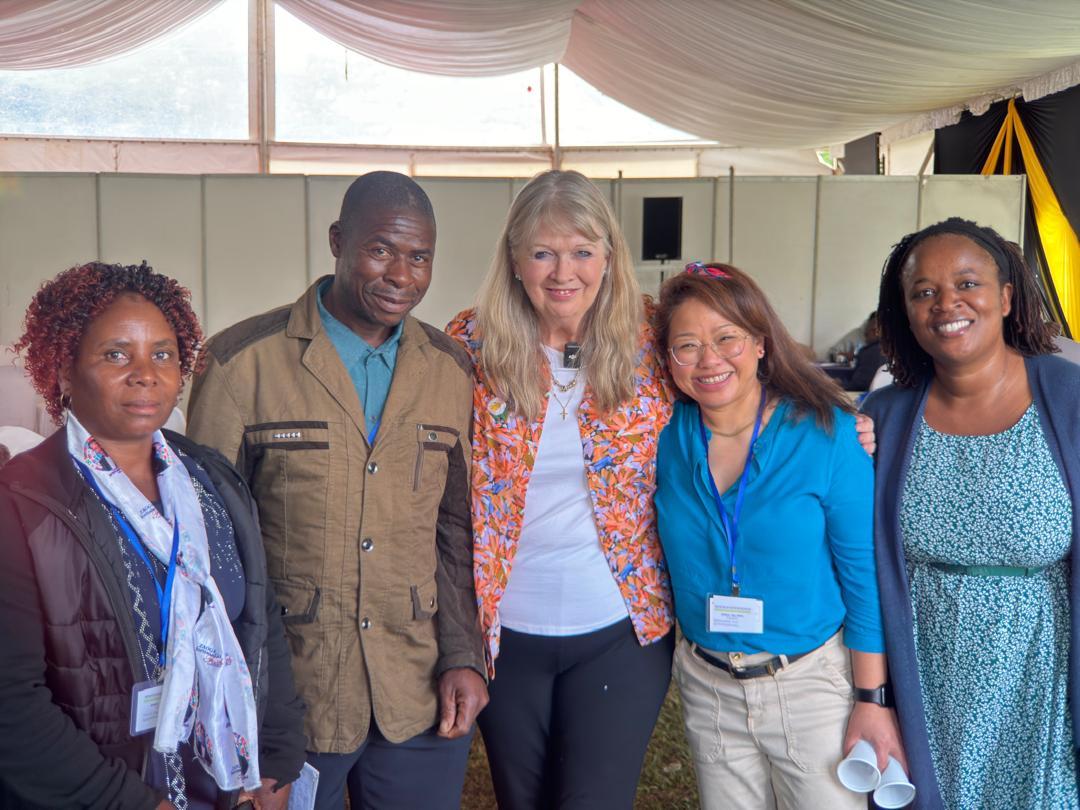
SMALL TEA GROWERS FROM MOZAMBIQUE WIN FIRST PLACE AWARD AT INAUGURAL TEA CONFERENCE
Small tea growers from Mozambique have won first place in the Emerging Specialty Tea category at the African Specialty Tea Conference and Expo in Kenya. The meeting of tea producers from across Africa was an opportunity for small tea farmers to connect with global markets, and the award highlighted the potential of teas from Mozambique.
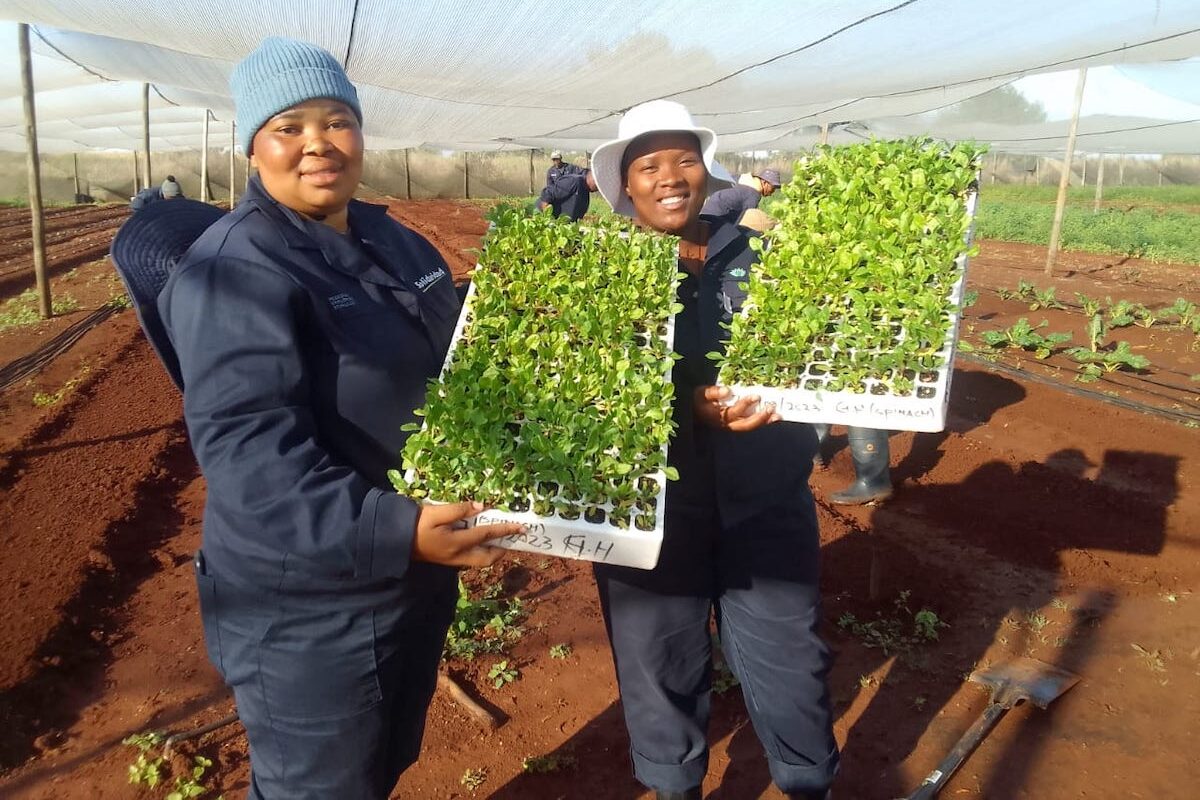
CELEBRATING THE TRANSFORMATION OF HORTICULTURAL VALUE CHAINS IN SOUTH AFRICA
A closing ceremony in South Africa celebrated the country’s Social Employment Fund as the project came to a conclusion. Hands-on training and mentorship transformed the lives of project participants and boosted the agricultural sector. The project encouraged the development of entrepreneurial ventures among unemployed youth, and contributed to a sustainable future for the country’s horticulture industry.
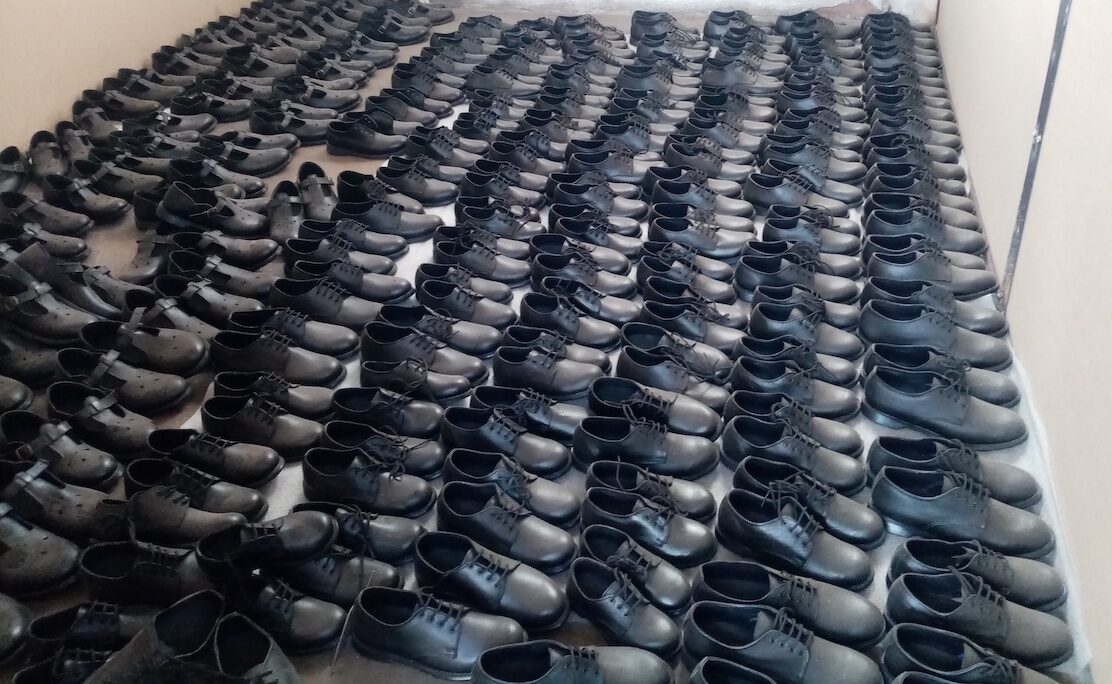
VIRTUAL DESIGN STUDIO SET TO REVOLUTIONIZE ZIMBABWE’S LEATHER SECTOR
With the creation of a computer aided virtual design studio, Zimbabwe’s shoe industry takes a big step forward in an effort to streamline the shoe design process. The innovative new studio will foster growth in the country’s leather sector through accessible technology and enhanced efficiency.
Sustainability Solutions
The power of innovation
Creating change that lasts
xxx
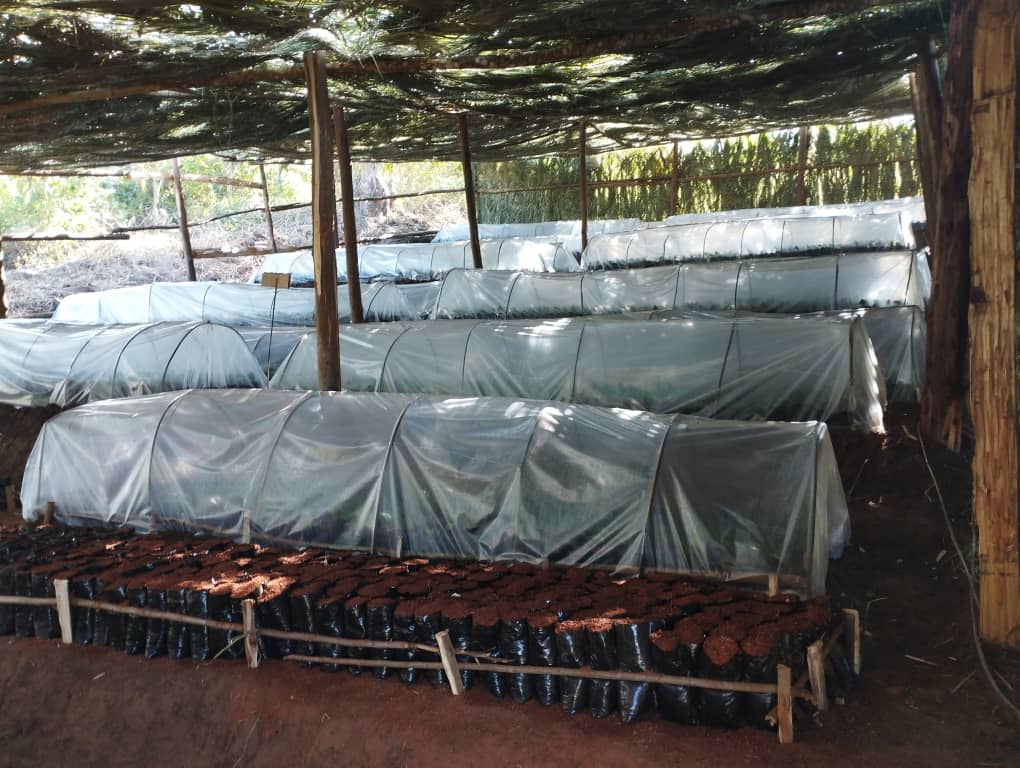
In 2024, Solidaridad piloted an electronic payment system for cotton purchases in Malawi through the Pathways to Prosperity programme. This innovation aimed to improve transparency across the cotton value chain and address challenges such as side-selling, which discourage investment by input suppliers, financial institutions, and offtakers. When buyers and financiers lack confidence that cotton will be delivered as agreed, they are less likely to provide inputs on credit or extend pre-season financing to farmers.
The digital payment system creates a verifiable transaction trail, offering assurance to all actors. For financial institutions, it means greater confidence in repayment. For offtakers, it guarantees traceability and fulfillment of supply contracts. For farmers, it ensures timely and secure payments.
The success of the pilot led to its endorsement by the Cotton Council of Malawi, which is now supporting its rollout across the entire cotton sector. By the end of the 2024/25 season, the system is expected to facilitate the sale of over 21,000 metric tons of cotton, enabling recovery of all input credit and investment disbursed during the season.
More than 44,000 farmers will use the system to complete over 150,000 digital transactions, making it one of the most extensive digitization efforts in Malawi’s agriculture sector. This shift is not just about technology; it’s about building trust, increasing efficiency, and laying the foundation for sustainable growth.
By reducing risk and improving traceability, this innovation has the potential to unlock greater investment and expand access to finance for smallholder farmers—ensuring that every cotton harvest becomes an opportunity to strengthen livelihoods and grow the economy.
In 2024, Solidaridad Southern Africa significantly advanced its digital transformation efforts through the promotion and rollout of the Open Farmer Data Ecosystem (OFDE). This innovative platform provides smallholder farmers with digital identities, enhancing their access to vital services such as price alerts, e-loans, and verified market credentials, thereby improving integration into formal value chains.
A notable collaboration with the Cotton Council of Malawi aims to integrate 150,000 cotton farmers into the OFDE. This partnership focuses on standardizing farmer records, improving creditworthiness, and enhancing traceability within the cotton sector, fostering greater trust between farmers and buyers. Additionally, the initiative facilitates the distribution of e-vouchers for inputs, promoting input autonomy and strengthening farmer–buyer relationships.
To support the OFDE’s rollout, Solidaridad collaborated with Kvuno, a social enterprise specializing in digital agricultural solutions. Together, they developed digital farmer identity cards capturing comprehensive information, including personal details, crops cultivated, and income from sales. This initiative streamlines data collection and sharing among stakeholders, reducing duplication and enhancing service delivery to farmers.
Promotional efforts included participation in the Africa Food Systems Forum (AGRF) in Kigali, Rwanda, where Solidaridad showcased the transformative potential of digital innovations in agriculture. The focus was on how bundled services—delivered through digital platforms, can improve accessibility and affordability for smallholder farmers, encompassing soil testing, weather data, insurance, and financial products to enhance productivity and resilience.
Recognizing the importance of coordinated efforts, Solidaridad organized a Multi-Stakeholder Platform on the OFDE in Lusaka, Zambia. This event convened representatives from civil society, the private sector, public institutions, industry leaders, and thought leaders to discuss the implementation and impact of the OFDE initiative, emphasizing improved coordination and data sharing among agricultural stakeholders to maximize impact
Through these initiatives, Solidaridad Southern Africa continues to champion the integration of digital solutions in agriculture, fostering inclusive growth and sustainable development across the region.
Through the RECLAIM Sustainability! (RS!) programme, Solidaridad Southern Africa has made significant strides in promoting gender equality within Malawi’s tea sector. Collaborating with the Tea Association of Malawi (TAML) and supported by the International Labour Organization (ILO), Solidaridad developed and launched a comprehensive Gender Equality, Sexual Harassment, and Discrimination Policy. This initiative aims to foster safer and more equitable workplaces by addressing and preventing sexual harassment and gender discrimination.
To ensure the effective implementation of this policy, Solidaridad facilitated the establishment of Gender, Harassment, and Discrimination Committees (GHDC) and Women Welfare Committees (WWC) across various tea estates. These committees play a crucial role in raising awareness, providing training, and instituting clear reporting mechanisms for harassment cases, thereby promoting a zero-tolerance culture within the sector.
A key component of this initiative is the development and dissemination of an anti-sexual harassment training manual. This resource offers practical guidance on identifying, reporting, and addressing incidents of sexual harassment, empowering employees to contribute to a respectful and safe workplace culture.
These concerted efforts underscore the scalability of gender inclusion when embedded in policy advocacy and practical support. Integrating women into value-added segments of supply chains amplifies their voice, income, and influence, fostering more inclusive and sustainable agricultural industries.
Organization & Governance
Expansion Malawi
The expansion of Solidaridad Southern Africa’s programme in Malawi during 2024 amplified the need for stronger in-country coordination and leadership. Farmer engagement in the country grew from approximately 19,000 at the start of the year to over 70,000 by year-end—an increase driven by the consolidation of service delivery models, improved digital registration, and broader project uptake.
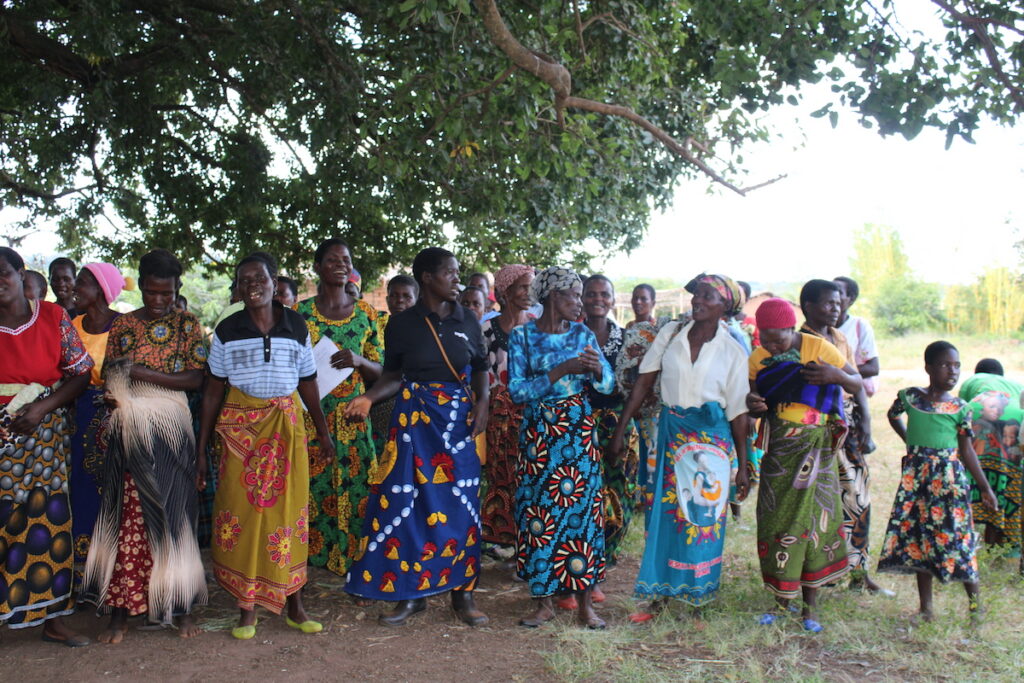
In response to this scale-up, a dedicated Country Programme Manager role was established to strengthen programme oversight and stakeholder alignment. Mr. Given Phiri, already part of the organization, was appointed to this role based on his familiarity with internal systems and the evolving country context. His mandate includes oversight of project implementation, team leadership, external engagement, and adherence to governance requirements.
Operational structures were also reinforced. The number of active projects rose to three, staff capacity increased from three to eight, and a permanent office location was secured to anchor delivery and improve stakeholder accessibility. These developments reflect a broader effort to ensure that programmatic expansion is matched by the institutional capabilities needed to sustain quality, accountability, and responsiveness at national level.
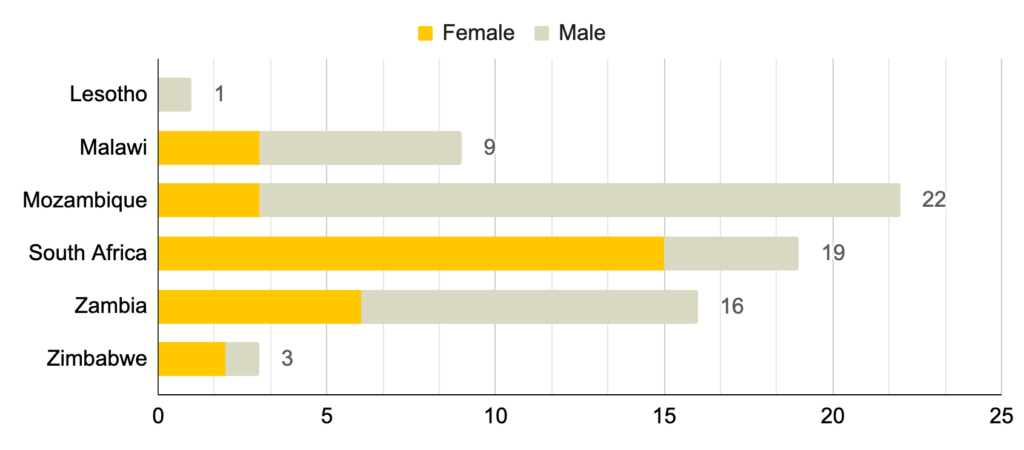
In 2024, Solidaridad Southern Africa made significant progress in advancing its human resource priorities, reinforcing its commitment to a resilient, high-performing, and engaged workforce.
Recognizing that continuous learning is essential to organizational excellence, the team enrolled 51% of staff in a structured capacity-building programme via Udemy. This initiative equipped employees with relevant and future-focused skills, enabling them to thrive in a dynamic development context.
To foster a culture of appreciation and motivation, the organization introduced peer and management-led recognition initiatives that celebrated outstanding contributions across all levels. This strengthened morale and helped embed a performance-driven ethos within the workplace.
A notable milestone was the successful resolution of all SEF Project-related disputes, including CCMA cases—demonstrating Solidaridad’s commitment to fair labor practices and constructive, timely conflict resolution.
The introduction of a structured succession planning process marked a strategic step toward leadership continuity, ensuring that critical roles are future-proofed and that promising talent is actively nurtured for advancement.
To promote equity and transparency, Solidaridad developed and rolled out a comprehensive Remuneration and Reward Policy. The policy aligns salary structures with industry benchmarks while reinforcing internal fairness. In parallel, the extension of healthcare benefits to all junior staff reaffirmed the organization’s dedication to holistic employee well-being.
Workplace safety was also enhanced through the provision of appropriate PPE to all operational teams, ensuring compliance with occupational health and safety standards and strengthening frontline protection.
The recruitment of two Country Finance Managers improved financial oversight and governance across the region, reinforcing Solidaridad Southern Africa’s commitment to robust internal controls and operational excellence.
These deliberate and strategic efforts in human resource development have strengthened organizational resilience, deepened staff engagement, and supported more effective delivery across Solidaridad Southern Africa’s programs.
In 2024, Solidaridad Southern Africa saw a remarkable 11,242% growth in media coverage, with 109 media mentions and an estimated 39,773,701 individuals reached. This surge in visibility was driven by a comprehensive media outreach strategy, combining proactive media engagement, digital campaigns, and strategic leadership positioning.
Central to this success was the development of the Southern Africa Communication Strategy, which was aligned with the global framework but tailored to regional priorities. The strategy aimed to elevate Solidaridad as a thought leader in sustainable agriculture and increase awareness of its impactful work across Southern Africa. Key projects, such as the biochar initiative in Zambia and Multi-Stakeholder Dialogue (MSD) workshops in Mozambique, Malawi, and Zambia, were highlighted through engaging videos, success booklets, and articles, amplifying Solidaridad’s influence across multiple platforms.
Southern Africa’s media efforts were extensive, utilizing press releases, field trips, press conferences, and media interviews. This outreach helped highlight important projects, including biochar and carbon credits, seed systems in cotton and tea, and policy advocacy efforts related to the Open Farmer Platforms. These actions significantly boosted media coverage, enhancing the region’s visibility in radio, TV, print, and digital media.
On social media, the region saw a 235.7% increase in reach on Facebook, engaging 22,000 users and recording 10.9K visits. On LinkedIn, Solidaridad achieved 93,079 impressions and 2,380 reactions, strengthening its professional engagement and visibility. Additionally, consistent activity on platforms like X (Twitter) increased real-time engagement and amplified key advocacy messages, creating a broader digital footprint for the region.
Internally, Solidaridad Southern Africa strengthened staff engagement and communication. The launch of an internal newsletter became a key platform for sharing staff achievements, project milestones, and organizational updates, fostering a sense of community across the region. An online media gallery was also established to centralize and share the organization’s collection of photos and videos, ensuring easy access to content for internal and external use.
To support media engagement, the region introduced a Media Engagement Protocol, streamlining communication and ensuring professional interactions with the media. Mid- and senior-level management participated in internal media training sessions, equipping them with the necessary skills to navigate interviews, craft compelling stories, and manage media challenges effectively.
Leadership positioning played a significant role in boosting visibility. The Managing Director of Southern Africa was strategically positioned as a thought leader, with insights shared on the Solidaridad Network website and across mainstream media. This positioning helped reinforce Solidaridad Southern Africa’s role as a credible and influential voice in sustainable agriculture.
Solidaridad Southern Africa also increased its presence at high-profile events. The region participated in 12 major events, with five staff members contributing as speakers or panelists. Notable engagements included the Africa Food Systems Forum in Rwanda, where the region played a key role in policy dialogues, and the Sustainable Apparel and Textiles Conference in Amsterdam. These platforms showcased the region’s leadership and deepened engagement with stakeholders. Furthermore, the region successfully hosted three side events, further solidifying its role in advancing sustainable agricultural practices.
A key internal initiative was the “We Deliver the Best Value” internal campaign, which highlighted how staff members from various departments contribute to the organization’s overarching mission. This initiative not only boosted staff morale but also reinforced Solidaridad’s values and fostered a shared sense of purpose. The campaign generated valuable content that was shared across external platforms, raising the profile of Solidaridad Southern Africa’s work.
Looking ahead, Solidaridad Southern Africa plans to continue building on these communication successes by expanding digital engagement, strengthening media relationships, and refining internal communication strategies. With further investments in digital platforms, strategic media partnerships, and targeted campaigns, the region is well-positioned to remain at the forefront of sustainable agricultural development, climate resilience, and inclusive growth in Southern Africa.
In 2024, Solidaridad Southern Africa made major strides in transforming its Programme Monitoring, Evaluation, and Learning (PMEL) systems into a high-functioning engine for data-driven decision-making, learning, and accountability. This transformation not only improved operational efficiency but also positioned the region to better measure and communicate impact, adapt strategies in real time, and drive systemic change across its programmes.
A cornerstone of this progress was the full operationalization of the region’s PMEL data model, aligned with digital tools that enable real-time tracking and adaptive management. Tools like the Digital Registration Tool, Training Tracker Tool (TTT), Business Solutions, Farmer-to-Market Platform, and the Cattle Grading App were revised and streamlined to align with new programme frameworks, including those of Pathways to Prosperity (P2P) and Acting Now.
This harmonization significantly improved data flow and quality across programmes, enabling teams to access reliable information and respond quickly to shifting realities on the ground. Notably, the migration of the KPIs dashboard from Looker Studio to Witni, an internal data visualization tool, enhanced data accessibility and usability. Through this shift, the organization unlocked powerful real-time insights, enabling programme managers and leadership to make evidence-based decisions with greater speed and precision.
One of the year’s most transformative achievements was the development and institutional use of Strategic KPIs. These indicators, co-designed with programme teams and aligned to Solidaridad’s results frameworks, are now regularly used in Executive Committee (ExCom) meetings to track progress and guide strategic conversations. This has reinforced an organizational culture focused on accountability, outcomes, and learning.
In parallel, the PMEL team led the regional review of MASP III, facilitating the documentation of outcomes achieved, challenges faced, and strategic pivots required for 2025. This effort aligned field-level evidence with Solidaridad’s global ambitions, ensuring that the final year of the strategic plan is informed by robust reflection and learning.
Additionally, robust evaluations and research studies were conducted, generating critical insights for programme adaptation and advocacy. Multiple baseline studies were completed across flagship initiatives, P2P (Malawi, Mozambique, Zambia), Acting Now (Mozambique), Hooves for Sustainability (Zambia), and the Social Employment Fund (South Africa). These shaped implementation by offering context-specific insights, while management responses ensured findings were translated into actionable strategies.
Several major evaluations in 2024 provided evidence on what works and why. The endline of the Zimbabwe Leather Project (SIPS) identified key enablers for competitiveness in the leather value chain. Evaluations of the Inclusive Red Meat Value Chain Project in Malawi and Zimbabwe outlined key outcomes in production and market systems. The Kvuno Phase 1 Impact Assessment, supported by the Bill and Melinda Gates Foundation, offered critical insights into digital farmer onboarding, while the Crop Insurance Adoption Study in Mozambique surfaced promising approaches to building financial resilience. These evidence-based learnings are now shaping programme design, resource allocation, and strategic advocacy across the region.
The progress made in 2024 reflects a deliberate shift toward outcome-oriented management and adaptive learning. Capacity-building initiatives, such as PMEL team enrollment in Udemy online courses, on topics like Creating a Theory of Change and Logic Model, Advanced Excel Functions, and AI in the Workplace, enhanced analytical capabilities. The team reported high satisfaction with the courses, noting improved confidence in using data tools for strategic decision-making.
The introduction of outcome-focused storytelling, through a new impact story series to be featured in the 2024 magazine, illustrates how data is now being used not only for accountability but also to communicate the deeper impact of Solidaridad’s work on lives, landscapes, and livelihoods.
While implementation was largely on track, some activities—such as the PRASL baseline and annual outcome surveys, faced minor delays, attributed to coordination timelines. These are on track for completion in Q1 of 2025 and will provide vital longitudinal data to inform REC-wide reporting and planning.
As Solidaridad Southern Africa enters the final year of its current strategic plan, PMEL will continue to play a critical role in institutionalizing systems and scaling successful models. Key priorities for 2025 include:
- Completing and disseminating results from the 2024 annual surveys
- Strengthening real-time feedback loops between data collection and field teams
- Consolidating lessons into learning briefs for partners and policymakers
- Expanding Witni dashboard usage among programme teams
- Leveraging digital insights to support investment cases in climate finance and inclusive business models
Ultimately, PMEL is not just a back-office function in Southern Africa. In 2024, it became a driver of strategy, innovation, and accountability. By linking field data to decision-making, Solidaridad Southern Africa is laying the foundation for sustainable, outcome-led impact at scale.
Finance
Income, expenditure and financial status
In 2024, Solidaridad in Southern Africa had an income and expenditure of €4.3 million each, with income levels staying consistent. The amount of income contracted by the region itself was 1.6 million.
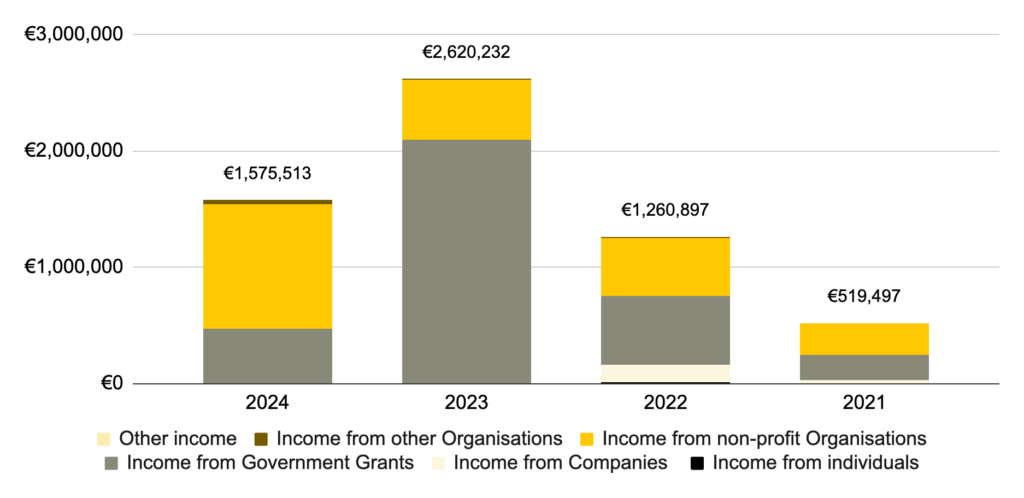
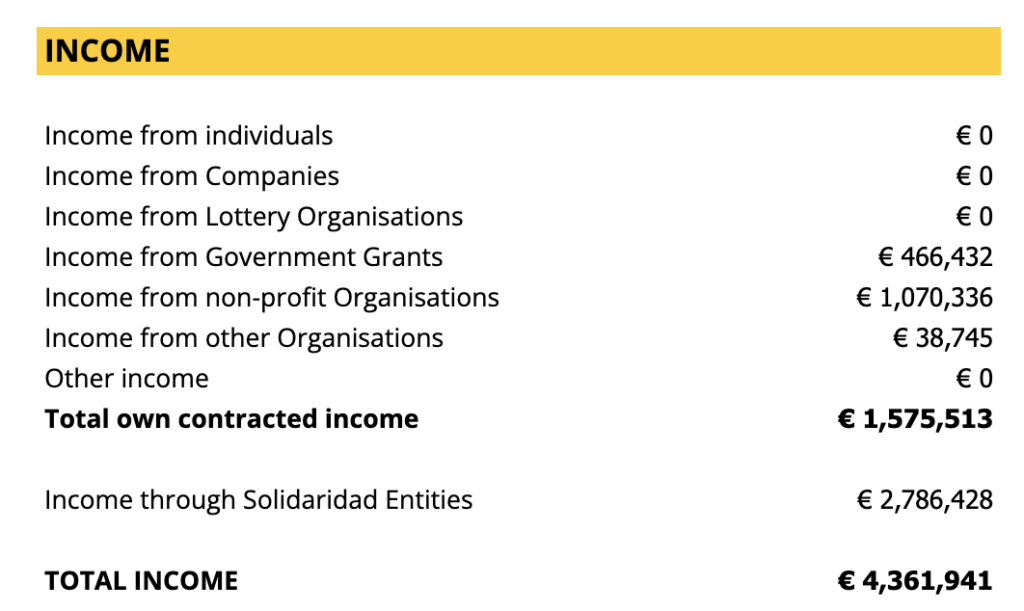
Total income for the year amounted to Euro 4.3 million. The apparent decrease in income is primarily attributed to the reclassification of payroll-related income administered by SAF for project participants, which is now directly settled by the donor, the Industrial Development Corporation (IDC). In substance, the level of funding has remained consistent, including continued support from the Presidential Employment Stimulus through the IDC, Euro 466,000 and Euro 515,000 from a significant three-year grant awarded by The Leona M. and Harry B. Helmsley Charitable Trust to support a sustainable livestock initiative in Zambia. Additionally, Euro 77,000 in new funding was secured from the Heineken Foundation. Funding facilitated through Solidaridad, sourced from the Dutch Ministry, contributed Euro 2.8 million for the 2024 financial year.
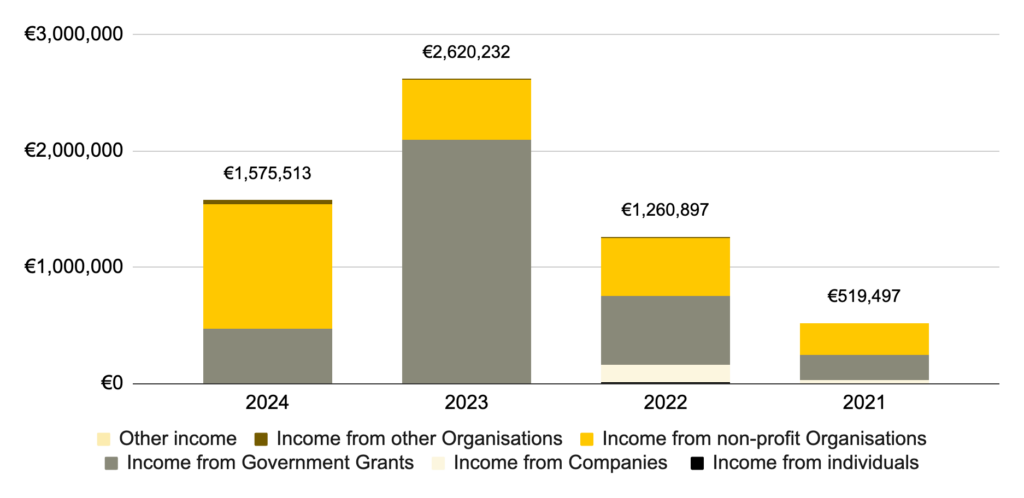

Total expenditure matched income at Euro 4.3 million, comprising Euro 1.48 million in activity-related costs, Euro 403,188 in overheads, Euro 193,000 in partner costs, and Euro 2.2 million in staff expenses. Compared to the previous year, total expenditure decreased by approximately Euro 950,000, largely due to the reclassification of partner costs under the IDC programme—where SAF administers payroll, but the donor processes direct payments. In contrast, staff and overhead costs increased, reflecting strategic investment in strengthening financial management capacity and support roles across country programmes.
A provisional surplus of Euro 12,398 is anticipated for 2024, pending final audited results, maintaining the positive financial trajectory observed in 2023.
All information above is based on the unaudited figures over 2024. The official audited financial statements over 2024 will be uploaded here as soon as they are available.

